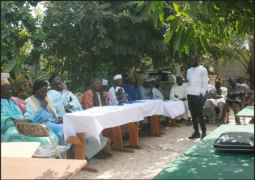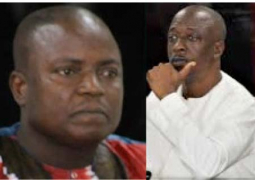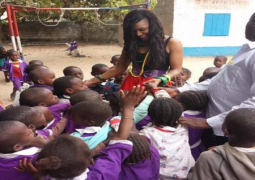With the many vices in society, drug is playing a negative role in the life of the old and young dwindling their minds to naught. Samuel Idonesit and his Gambian counterparts managed to set up a Rehabilitation centre at Lamin Kombo North to teach drug addicts on how to be freed from drug and live a positive life style thus teaching others to be drug free. In the era of fighting drugs by government, some addicts are positively thinking of doing away with such a menace. But those graduating these addicts are faced with lots of constraints and are now crying to government and others to visit them and give them a help in hand so as to help strengthen their project for a drug free society. Society and Development talks with Samuel Indonesit, the Executive Director in detail to let you know about their work. Enjoy yourself and decide.
S&D: What is the name of your centre?
Samuel Indonesit: It is simply called, Rehabilitation and Development Agency, Lamin.
S&D: How did the Rehabilitation come about?
Samuel Indonesit: The director of New Life Rehabilitation in
S&D: How did you get the motivation?
Samuel Indonesit: Well, I was also an addict and I had passed through the centre in
S&D: When did you start the centre?
Samuel Indonesit: I arrived here in August last year and I began to invite people to become members of our board so we began the registration. By March 2010 we had very good members on the board.
S&D: Name two of your key members?
Samuel Indonesit: John Gomez, the Chairman, Rose Jammeh our General Secretary, these are real good members and they have the centre at heart as well.
S&D: When did you start operation?
Samuel Indonesit: We were registered in March and in April we started operation. We identified a place in Serrekunda where they smoke (Free-base) cocaine under carbon. Some started coming and some started complaining and said they could not stop so suddenly. Some demanded tranquillisers and Methadone to help them out. Some were able to stay and some because they did not get their want ended up running away.
S&D: Did those who stay continued to stay on?
Samuel Indonesit: Well, when the World Cup came because we do not have video facility and they wanted to watch they all went on to their various places. We had to close for that time till after the World Cup. Therefore my answer is yes those who stayed continued to stay on.
S&D: Why do you think many addicts show interest in the rehabilitation programme here?
Samuel Indonesit: Because of government's strong stance against drug, the two places where they used to go to smoke were closed down. Most of the boys were arrested. More and more addicts now showed interest in our rehabilitation programme.
S&D: How many men are you rehabilitating right now?
Samuel Indonesit: We cannot go beyond five people because of financial constraints. Due to our limited resources and the lack of sponsors, we could not take in a lot of them. We have stopped going for them, we know we cannot take and maintain more that this number for now till help comes.
S&D: Have you any good relationship with stakeholders that will enable development of the centre?
Samuel Indonesit: We have good relationship with the government, like the RVTH, the Psychiatric Hospital, Tanka Tanka Mariama Kunda, we are relating with the Ministry of Health and we are trying to collaborate with the Ministry so that we can collaborate more closely with Psychiatrist Units of the country.
S&D: Whom do you want to come to your aid?
Samuel Indonesit: Well due to the increase in number of our clients that require our service, we can't meet the demand so we are asking the public to come to our aid. We are asking president Jammeh to help us so as to be able to help the addicts.
We have a three-bed-room flat. If the house is full we should be able to have twelve people but due to lack of money we cannot go beyond five people.
S&D: How long do addicts stay before the are rehabilitated?
Samuel Indonesit: It is a one-year rehabilitation programme. The first six months is solely spent inside. No visitors, phone calls. We expect that the drug would have left them during the first half of the year. There is no handling of money to avoid temptation and there are no visitors allowed. The second six months is reintegration programme, going back to the society. Those who have skills will go back to it and we monitor their progress. And those without are trained within the six months of rehabilitation. We hope to start this by January 2011 at our second home, so that we would bring new members in.
S&D: What do you do to rehabilitate these addicts?
Samuel Indonesit: We do counselling basically, we share our experience, we invite people from government departments, Schools, business people and they speak to them. We also do gardening since the compound is big. We are hoping that by the time the government intervenes, we shall try to open a poultry house. We hope to keep sheep and goat so that they will be able to ear something for themselves while they are here.
S&D: Have you achieved anything so far?
Samuel Indonesit: We have indeed achieved a lot so far. The first two months was the pilot programme, April to June. They graduated and are integrated. The present group is the first batch that would do the full year. Since June 12 they have not been going out, they are not smoking. For someone who has been an addict and can now stay without it despite difficulties that we are going through it is an achievement.
S&D: What is your vision?
Samuel Indonesit: Our vision is to see a society where there is no drug and the consequences of addiction, which is crime, prostitution, and other forms of violence in society are all related to addiction.
Taking these people out of this situation will go back well equip into society, returning as good Gambians. Taking care of their family's problems and educating their children and they too will fight drug abuse.
S&D: What plans have you to educate others on drug abuse?
Samuel Indonesit: We are planning drug enlightenment and education programme for young people. We shall visit schools Mosques, Churches and youth clubs so as to let those who have gone through the rehabilitation talk to them. It would be from the horse's mouth. These are our plans; that is why we are appealing to our president to come to our aid. We are appealing to NGOs in the
S&D: Any last words?
Samuel Indonesit: We need support. We want a bigger accommodation, need help in feeding addicts, we need a van to take them to hospital even at mid night, and we need help to buy the drugs that may not be available at the RVTH. We need volunteers to work with us like social workers who want to work with drug addicts.
S&D: Are you thankful to any one so far?
Samuel Indonesit: We are thankful to those who are sympathetic to the addicts, particularly friends, John Gomez, Mr. Godwin Olalay, Dr. Kebey, Dr. Abraham, Sr. Ann Marie of the




